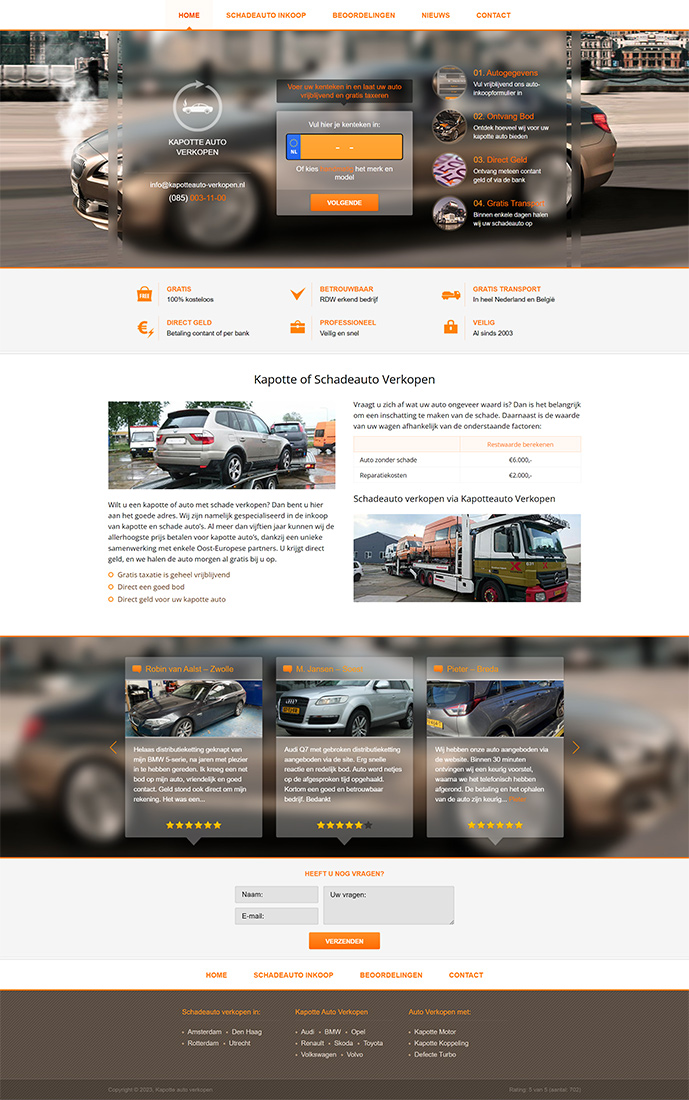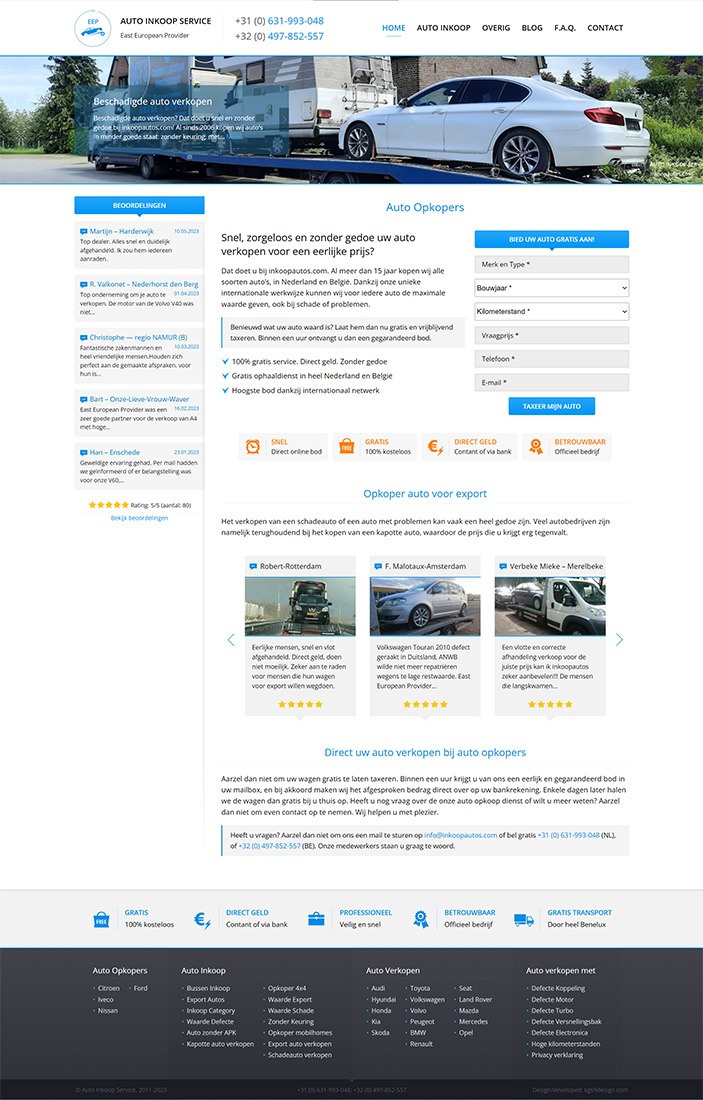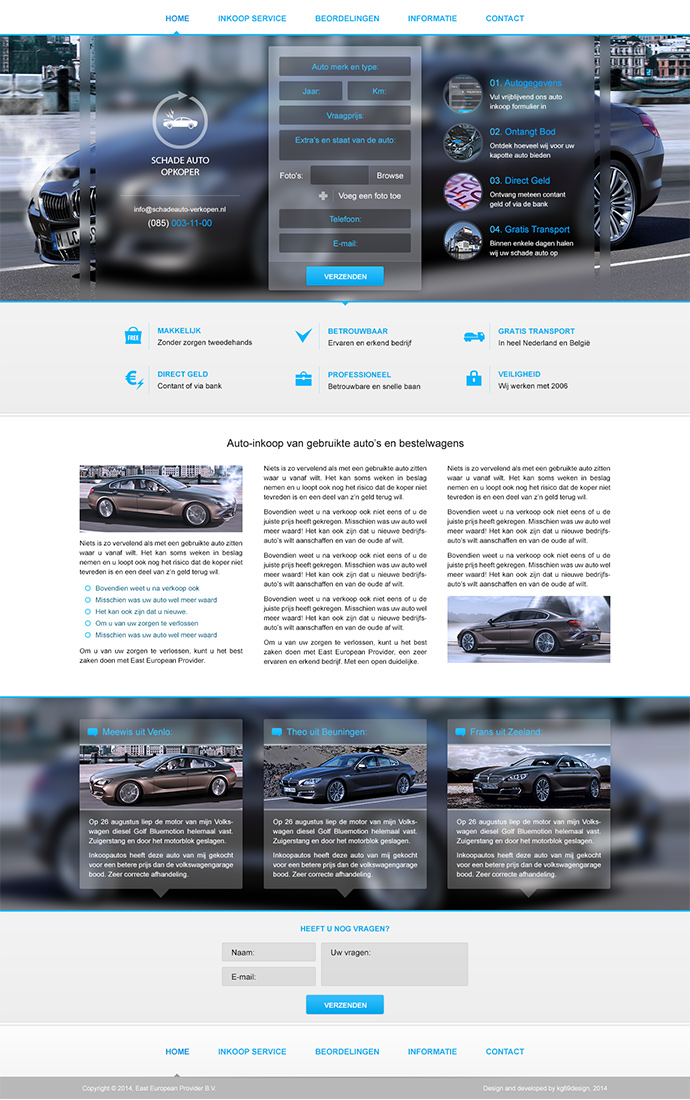Complex Website Development
Allow Us to Make Your Web Project a Reality!
Booking & Reservation Systems Enable online bookings and transactions to help businesses like hotels and restaurants efficiently organize their reservation systems. ... Show all ↓
Vacation Rentals & eCommerce Websites Provide options for buying goods and booking vacation stays with easy-to-use interfaces and secure payment options online. ... Show all ↓
Payment Gateway Integration Integrate secure methods to handle online payments on your website, ensuring a seamless and safe checkout process for customers. ... Show all ↓
Synchronization Implementation Ensure the consistency and accuracy of data across different platforms or systems in real-time, improving reliability and decision-making. ... Show all ↓
Software for Planning & Project Management Assist in planning, organizing, and tracking project progress. This support facilitates collaboration and helps meet deadlines effectively. ... Show all ↓
Customer Admin Areas Secure personal areas on your website where users can manage their profiles, orders, and personal details for a more engaging online experience. ... Show all ↓
Get a Free Consultation!
Chat with our Consultants!
Request a Callback
Reasons to Choose Us for Developing
Your Website
Examples of Our Projects


















How Do We Work
You’ll get top-notch results, because we have over 10 years of experience and clearly understand what to focus on when developing a web project. We are proud that 95% of our partners and 90% of our customers love what we do!
Our Keys To Success
We Accept Payments
Key Insights about Complex Web Development
Defining a Complex Website
Complex websites feature advanced functionalities, extensive content, and system integrations. Characteristics include custom user interactions, real-time data handling, e-commerce, advanced security, and API integrations. These sites offer dynamic, user-specific content, relying on robust backend infrastructure for data management and user engagement.
- Advanced functionalities and content depth.
- Integration with multiple systems and sophisticated security measures.
- Dynamic content delivery tailored to user preferences.
Nature of Complex Web Systems
A complex web system integrates intricate user, software, and hardware interactions within a web-based platform. It includes components like databases and application servers to deliver diverse functionalities. Designed for scalability and reliability, complex systems support a broad spectrum of operations, accommodating everything from e-commerce to enterprise applications.
- Supports intricate interactions and comprehensive functionalities.
- Designed for data handling, security, scalability, and reliability.
The Complexity of Web Development
Web development spans a spectrum from basic to complex, dictated by the project’s scope. Complex development involves dynamic content, user interaction, and backend integration, requiring expertise in various technologies and frameworks to meet demands for custom functionality, scalability, and security.
- Variability from simple websites to sophisticated web applications.
- Increased complexity with custom features, scalability, and system integration.
Complexity in Website Development
Website development complexity stems from creating scalable, functional, and secure applications tailored to user needs. It encompasses technology integration, diverse programming languages, and the development of complex features like user authentication and real-time communication. Complexity is further amplified by performance, accessibility, SEO optimization, and cross-compatibility challenges.
- Integration of various technologies and frameworks.
- Development of intricate features and optimization for performance and accessibility.
Characteristics of Complex Websites
Complex websites provide advanced functionalities, encompassing e-commerce platforms, social networks, and custom applications. These sites demand significant design and development efforts for efficient operation, security, and user experience, highlighting the extensive capabilities and interactive nature of complex web platforms.
- Advanced features facilitating interactive experiences and integrations.
- Significant design and development efforts for efficiency and security.
Grasping the concept of complexity in web development is essential for tackling the intricacies of building feature-rich, advanced websites. The evolution of complex website development challenges developers to employ a blend of technical expertise, creativity, and strategic insight to meet the growing demand for sophisticated online platforms, underscoring its significance in today’s digital ecosystem.
Planning Complex Website Development
Effective planning for complex website development involves defining scope and goals, conducting market and user research, and outlining detailed project plans with timelines and milestones. Essential steps include designing site architecture, selecting a suitable technology stack, and planning for scalability and security. Establishing continuous testing and feedback mechanisms is crucial for ensuring quality and meeting user expectations throughout the development lifecycle.
- Define project scope, goals, and target audience.
- Conduct research on market trends and user needs.
- Develop a comprehensive project plan and design site architecture.
The Seven Phases of Building a Website
Building a website unfolds in seven key phases: Discovery and research to understand the project’s foundation; Planning for detailed project management; Design for visual and user experience; Content development for engaging material; Development to build the site’s core functionalities; Testing and QA for ensuring optimal performance; and finally, Launch and maintenance for ongoing site support and improvement.
- Discovery and research, planning, and design.
- Content development, site development, and testing/QA.
- Launch and maintenance for continual site optimization.
Web Development Steps
Web development encompasses steps from requirement analysis and design to deployment and maintenance. It starts with a clear analysis of requirements, followed by UI/UX design, coding, database integration, thorough testing, and finally, deployment to the public. Ongoing maintenance ensures the website remains current and functional, addressing new needs and challenges as they arise.
- Requirement analysis, design and prototyping, and development.
- Database integration, testing, deployment, and maintenance.
Navigating the development of a complex website requires a comprehensive approach from initial planning through to launch and beyond. Adhering to structured development phases ensures that complex web projects are manageable, meeting both user needs and business objectives. This methodical process is fundamental in tackling the challenges of complex website development, leading to successful, innovative web platforms that stand out in the digital landscape.
Duration of Complex Website Construction
Constructing a complex website spans a few months to over a year, is influenced by the scope, complexity, team expertise, and stakeholder coordination. Extensive planning, custom functionality development, design, and testing phases dictate the timeline, with stakeholder coordination and revisions potentially extending the duration.
- Timeline influenced by project scope, complexity, and team expertise.
- Includes phases from research and design to development and testing.
Hourly Investment for a Complex Website
Building a complex website demands 500 to 5,000 hours or more, affected by the site’s features, design, content, and technology stack. The development team’s proficiency significantly impacts the total hours required, alongside project management and quality assurance efforts.
- Hours vary based on features, technology, and team efficiency.
- Comprehensive project management and quality assurance are crucial.
Cost of Developing a Complex Website
The cost for a complex website ranges from $10,000 to $100,000 or beyond, determined by scope, design complexity, custom features, and integrations. Decisions between development agencies, freelancers, or in-house teams also influence the budget, alongside considerations for ongoing maintenance and updates.
- Costs influenced by project scope, custom functionalities, and team selection.
- Ongoing expenses for maintenance and updates are additional considerations.
Web Development Project Costs
Web development project costs vary, starting from a few thousand dollars to exceeding hundreds of thousands, depending on complexity and features. Essential cost factors include design and development hours, technology choices, and ongoing support. A clear scope definition and scalability considerations are vital for effective budgeting.
- Varying costs based on complexity, features, and execution team.
- Importance of clear scope definition and future scalability planning.
Navigating the time and financial commitments necessary for complex website development is essential for the successful realization of sophisticated web projects. Strategic planning and management of these aspects allow businesses to create a valuable and enduring online platform, reflecting the significance of understanding and allocating the appropriate resources for development endeavors.
Scope of Web Development Services
Web development services span the gamut from website design to maintenance, covering front-end and back-end development, database management, CMS development, APIs integration, e-commerce solutions, and more. These services ensure a website is functional, secure, optimized, and accessible across all devices, often including SEO and mobile responsiveness enhancements.
- Includes design, development, database management, and optimization.
- Focus on security, SEO, and mobile responsiveness.
Web Design vs. Web Development Services
Web design and web development services cater to different aspects of website creation. Design focuses on the aesthetic and user experience, while development involves the technical construction and functionality, including coding and integrating server-side applications to ensure the site operates smoothly.
- Web design: Aesthetic and usability focus.
- Web development: Technical construction and functionality.
Incorporation of Programming in Web Development
Programming is integral to web development, involving both front-end and back-end coding to build and maintain websites and web applications. It ensures interactive, functional, and efficient web experiences for users.
- Front-end development with HTML, CSS, JavaScript.
- Back-end development with languages like PHP, Ruby, Python.
Web Development’s Role in Creating Apps
Web development encompasses the creation of web applications, using web technologies to develop interactive, app-like experiences accessible through a browser. This includes SPAs, PWAs, and other sophisticated web-based applications, extending beyond traditional website functionality.
- Focuses on interactive web applications like SPAs and PWAs.
- Delivers app-like experiences within a browser.
Outsourcing in Web Development
Outsourcing web development involves hiring external entities to undertake various web project tasks, offering access to specialized skills and facilitating cost-effective project management while allowing businesses to concentrate on core operations, enhancing their web presence through professional services.
- Enables access to specialized skills and efficient cost management.
- Allows businesses to focus on core operations.
Description of a Website Development Company
A website development company provides comprehensive web development services, from design to maintenance. These companies leverage skilled professionals across design, development, content, and SEO to offer tailored solutions that align with client goals, supporting a wide range of web development needs.
- Offers a full range of web development services.
- Employs skilled professionals for tailored web solutions.
Marketing Web Development Services
Marketing web development services involves showcasing expertise, demonstrating service benefits, and employing strategies like content marketing, social media engagement, client testimonials, and SEO to attract and retain clients, emphasizing the value and impact of professional web development.
- Utilize content marketing, social media, and client testimonials.
- Employ SEO and targeted advertising to increase visibility.
Leveraging web development services and outsourcing plays a pivotal role in establishing and enhancing online platforms, offering businesses expertise and resources to craft impactful digital experiences. Through dedicated services or strategic outsourcing partnerships, organizations can navigate the complexities of web development, driving innovation and growth in the digital domain.
Choosing Web Development for Your Business
Opting for web development is crucial for any business aiming to establish a strong online presence, enhance accessibility to a global audience, and drive growth. A professional website acts as a digital storefront, showcasing your offerings and engaging customers around the clock. It’s fundamental for improving user experience, boosting SEO, and integrating with broader digital marketing strategies, ultimately building credibility and trust with your target audience.
- Acts as a digital storefront for global accessibility.
- Enhances user experience and supports SEO and digital marketing.
- Builds credibility and trust with potential customers.
Web Development’s Advantages for Businesses
Web development offers a cost-effective avenue for marketing and streamlining operations, reaching a broader audience with lower expenses compared to traditional marketing. It enables automation of business processes, leading to increased efficiency. Additionally, the insights gained from web analytics can guide strategic decisions, while a responsive design boosts customer engagement and conversions, fueling business growth and success.
- Facilitates a cost-effective marketing and operational strategy.
- Provides insights into customer behavior and preferences.
- Increases customer engagement and drives conversions.
The Role of a Web Developer
A web developer plays a pivotal role in the creation, testing, and maintenance of websites and web applications. They handle everything from the visual and interactive front-end to the complex back-end logic and database interactions. Employing a range of programming languages and technologies, web developers ensure sites are responsive, accessible, and SEO-friendly. Collaborating with designers and content creators, they strive to produce engaging, functional, and aesthetically appealing online platforms.
- Develops, tests, and maintains websites and applications.
- Ensures websites are responsive, accessible, and optimized for search engines.
- Collaborates with designers and content creators for cohesive web solutions.
In today’s digital landscape, web development is indispensable for businesses seeking to establish a robust online platform. It enables the crafting of dynamic, user-centric websites that bolster business objectives, offering a strategic advantage in the competitive online marketplace. Leveraging web development, businesses can effectively connect with their audience, streamline operations, and pave the way for sustained growth and success.
Website Update Frequency
Maintaining a successful website necessitates regular updates. Content should be refreshed monthly, while major redesigns or functionality updates should occur every 2 to 3 years to align with technological progress and evolving user needs. Security and software updates are critical to implement promptly upon release, safeguarding against vulnerabilities, enhancing user engagement, and supporting SEO.
- Update content monthly and consider major updates every 2 to 3 years.
- Apply security patches and software updates immediately.
The Importance of Clean Code
Clean code is essential for readability, maintainability, and efficiency in development. It simplifies debugging and feature development, boosts performance, minimizes bugs, and ensures web standards compliance, improving accessibility and compatibility. Clean code benefits both the development team and the end users by facilitating a high-quality user experience.
- Facilitates maintainability and scalability.
- Contributes to better performance and fewer bugs.
Defining a Fast Website
A website is considered fast if it loads in under 2 seconds, meeting user expectations for speed and responsiveness. Achieving fast loading times involves optimized coding practices, image compression, effective caching, and choosing a reliable hosting service. A fast website enhances user experience, encouraging longer visits and deeper engagement with the site’s content.
- Load times under 2 seconds are ideal for user retention.
- Optimization techniques are crucial for achieving fast loading times.
Website Speed’s Impact on SEO
Website speed is a critical SEO factor, influencing search rankings, user experience, and site visibility. Fast loading times are rewarded by search engines with higher rankings, while slow speeds can lead to increased bounce rates and diminished user engagement, adversely affecting SEO outcomes. Optimizing site speed is thus vital for search visibility and overall performance.
- Direct correlation between site speed and SEO rankings.
- Speed optimization enhances visibility and user satisfaction.
Attending to the technical dimensions of web development, such as consistent updates, the pursuit of clean code, and optimizing for speed, is fundamental for crafting a secure, engaging, and competitive online platform. These efforts fortify the website’s infrastructure, bolster user experience, and enhance SEO effectiveness, positioning businesses to successfully captivate and interact with their digital audience.
Types of Website Development
Website development encompasses three primary categories: front-end, back-end, and full-stack. Front-end development focuses on the user interface and experience, employing technologies like HTML, CSS, and JavaScript. Back-end development manages the server side, including databases and server logic, using languages such as PHP and Python. Full-stack development merges both, offering a comprehensive skill set for complete website creation and maintenance.
- Front-end development for user-facing elements.
- Back-end development for server-side functionality.
- Full-stack development encompasses both areas.
Web Project vs. Website
A web project entails the entire process of creating a website, including planning, design, development, and deployment. It represents the journey from concept to launch, involving various tasks and objectives. A website, however, is the outcome of this process—a series of interconnected web pages accessible online, serving as the digital face of a brand or entity.
- Web project: The comprehensive process of website creation.
- Website: The final product, accessible to users online.
Main Types of Web Development
Web development can be broadly divided into three main types: front-end, back-end, and full-stack. Front-end development ensures the website is visually appealing and interactive, back-end development focuses on functionality and performance, and full-stack development covers both aspects, providing an all-encompassing approach to building and maintaining web applications.
- Front-end for layout and interactivity.
- Back-end for functionality and database management.
- Full-stack for a holistic approach to web development.
The Importance of a Unique Website
Having a unique website is vital for differentiation and branding, allowing a business to stand out in the digital space. A distinctive website captures attention, enhances user engagement, and fosters brand loyalty by offering a memorable and tailored online experience. In today’s competitive online environment, uniqueness in web design and functionality can significantly impact a brand’s visibility and success.
- Key for standing out and attracting attention.
- Enhances user engagement and fosters brand loyalty.
- Crucial for competitive differentiation and success.
Grasping the various facets of web development and the strategic importance of a unique website is essential in the digital realm. Through tailored development approaches and distinctive design, businesses and individuals can effectively engage their audience, highlighting the pivotal role of web development in establishing a compelling online presence.
Securing Complex Websites
To safeguard a complex website, implement a multi-layered security strategy throughout development and post-launch. Incorporate secure coding, frequent security audits, and essential features like SSL and data validation. Continuously monitor for threats, update systems, utilize WAFs, and conduct penetration tests to address vulnerabilities and enhance security measures over time.
- Adopt secure coding practices and conduct regular security audits.
- Post-launch, use WAFs and IDS for ongoing threat detection.
Project Management for Complex Web Projects
Effective project management in complex web development entails clear scope definition, agile methodologies, and strong communication. Utilize project management tools for task tracking and resource allocation, embrace agile for flexibility, and ensure continuous engagement with all stakeholders to facilitate collaboration and adapt to changes, ensuring project objectives are met efficiently.
- Structured planning, agile methodology, and collaborative communication.
- Use project management tools for efficient task and resource management.
UX/UI Design in Complex Websites
For UX and UI design in complex websites, prioritize user research to inform design decisions, creating intuitive and engaging interfaces. Develop personas and user journey maps, employ responsive design principles, and conduct usability testing to refine the interface, ensuring a seamless and accessible user experience across devices.
- Conduct user research and create personas for informed design choices.
- Focus on clean, responsive design and incorporate user feedback.
Case Studies of Complex Website Development
Professionals typically showcase complex web development projects in portfolios, highlighting challenges, solutions, and outcomes. These case studies provide insights into custom functionalities, system integrations, and the application of best practices in design and development, reflecting a developer’s capability to address complex web development challenges.
- Portfolios offer insights into a developer’s approach to complex challenges.
- Case studies detail project goals, challenges, solutions, and outcomes.
Technologies and Frameworks for Complex Websites
For building complex websites, consider scalable, secure technologies and frameworks. Node.js, Django, and Laravel offer backend robustness; React, Angular, and Vue.js enable dynamic frontend development. Databases like MongoDB and PostgreSQL handle data efficiently. These choices are supported by strong communities, offering extensive documentation and versatility for various web applications.
- Backend: Node.js, Django, Laravel for performance and security.
- Frontend: React, Angular, Vue.js for dynamic, responsive UIs.
- Databases: MongoDB, and PostgreSQL for efficient data management.
Navigating the complexities of web development demands a strategic approach to security, project management, and user experience design. By embracing advanced technologies and frameworks, developers can create scalable, efficient, and secure platforms. Examining case studies further enriches understanding, offering practical insights into tackling diverse web development challenges, thus advancing the craft of building complex websites.
Scalability and Future Expansions
For scalability and future expansions, design with flexibility in mind, utilizing scalable databases and cloud services, and adopting a microservices architecture. A modular design facilitates the addition of features seamlessly, ensuring the site remains performant and responsive as it grows.
- Use scalable databases and cloud-based services.
- Implement microservices architecture for better flexibility.
Testing and Quality Assurance Best Practices
Adopt a comprehensive testing strategy including unit, integration, system, and acceptance testing. Utilize automated tools for efficiency, incorporate CI/CD for continuous quality assurance, and engage in regular code reviews and user testing to identify and resolve issues promptly.
- Implement various testing types for thorough quality assurance.
- Use automated testing tools and CI/CD practices.
Integrating Third-party Services or APIs
Select reputable third-party services that match your technical requirements. Securely authenticate API integrations and implement robust error handling. Regular monitoring and updates ensure ongoing compatibility and performance, maintaining the website’s functionality.
- Ensure compatibility and security in API integrations.
- Maintain functionality with error handling and regular updates.
Post-launch Support and Maintenance Services
Offer comprehensive post-launch services including regular updates, security monitoring, and technical support. Perform performance optimizations and scalability assessments to accommodate growth. Content updates and SEO efforts maintain relevance and competitiveness.
- Conduct regular software updates and security monitoring.
- Optimize performance and assess scalability regularly.
Ensuring Performance and Speed
Monitor performance metrics using tools like Google PageSpeed Insights and implement optimizations such as image compression, code minification, and CDN usage. Strategies like lazy loading and caching, along with scalable server resources, ensure optimal speed and user experience.
- Use performance metrics and testing tools for continuous optimization.
- Adopt strategies like lazy loading and caching for speed improvements.
Navigating the complexities of web development demands attention to scalability, meticulous testing, seamless third-party integrations, and dedicated post-launch support. These elements are foundational to a website’s ability to grow, perform optimally, and meet evolving user needs, ensuring its long-term success and resilience in the dynamic online landscape.
Latest Trends in Complex Website Development
Emerging trends such as Progressive Web Apps (PWAs), artificial intelligence (AI) and machine learning for personalization, headless CMS for flexibility, enhanced cybersecurity measures, blockchain for secure transactions, and VR/AR for immersive user experiences are reshaping complex website development. These advancements enable businesses to craft cutting-edge, secure, and highly engaging online platforms.
- Progressive Web Apps (PWAs) for a seamless user experience.
- AI and machine learning for dynamic content personalization.
- Headless CMS and blockchain technology for flexibility and security.
Data Management and Storage in Complex Projects
Effective data management in complex projects involves choosing the right DBMS, leveraging cloud storage for scalability, ensuring robust data security measures, and optimizing database performance. These steps are essential for managing vast amounts of data efficiently, ensuring its integrity, and safeguarding sensitive information.
- Selecting appropriate DBMS and utilizing cloud storage solutions.
- Implementing data encryption and secure access controls.
The Role of Content Management
Content management is vital in complex website development, facilitating streamlined content creation, management, and delivery. Offering solutions like customizable CMS platforms, headless CMS for flexibility, and AI-powered optimization tools, content management systems support varied needs, ensuring content is fresh, relevant, and engaging.
- Customizable and headless CMS platforms for diverse content needs.
- AI-powered tools for content optimization and personalization.
Ensuring Website Accessibility
To make complex websites accessible to all users, including those with disabilities, adherence to WCAG, regular accessibility audits, and implementation of accessible design principles are imperative. This approach ensures inclusivity, enhancing user experience for a wider audience by making websites navigable, understandable, and usable for everyone.
- Adhering to WCAG and implementing semantic HTML and ARIA landmarks.
- Designing with consideration for contrast, font size, and providing alternative text.
SEO Optimization Strategies for Complex Websites
SEO optimization for complex websites involves comprehensive keyword research, content quality, mobile optimization, and site performance enhancements. Structured data, efficient coding, logical site structure, and UX improvements, along with acquiring quality backlinks, play critical roles in elevating search rankings and visibility.
- Employing keyword research, structured data, and quality content creation.
- Improving site performance, mobile-friendliness, and user experience.
Adapting to the latest trends, managing data effectively, optimizing content management, ensuring accessibility, and implementing SEO strategies are foundational to the development and success of complex websites. These elements contribute to creating dynamic, secure, and user-centric platforms, addressing the evolving demands of the digital age and enhancing the online presence of businesses.
Show all ↓
Benefits of Your Own Website
Market Expansion
Expanding your market is pivotal for growth. Developing a complex website enables your business to reach and engage with audiences globally, breaking geographical barriers and opening up a world of opportunities for increased visibility and sales.
Increase Sales
A well-designed website serves as a powerful sales tool, operating 24/7. It allows customers to purchase your products or services anytime, anywhere, significantly boosting your sales potential beyond traditional business hours.
Build Trust and Credibility
A professional website enhances your brand’s credibility. With comprehensive information, customer testimonials, and a polished design, your site communicates reliability and trustworthiness to potential customers.
Enhanced SEO Performance
A well-developed complex website is optimized for search engines from the start. With strategic design and content, your site can achieve higher rankings in search results, increasing visibility and attracting more organic traffic.
Innovative Solutions
Complex website development provides the flexibility to integrate innovative solutions and technologies, enhancing user experience and setting your business apart from competitors.
Collaborative Opportunities
A comprehensive website can attract partnerships and collaborations, expanding your network and fostering growth opportunities through shared initiatives and projects.
Easy Advertising
Leverage your website for targeted advertising and promotions, reaching the right audience at the right time with cost-effective marketing strategies that drive brand awareness and customer engagement.
Fresh Content
Keep your audience engaged with fresh, relevant content. Updating your website with new blog posts, products, and services encourages repeat visits and strengthens customer relationships.
Secure Your Brand Online
Protect your brand identity and domain online against competitors and cyber squatters. A complex website ensures your brand is represented accurately and securely.
Customized Functionality
Complex website development allows for customized functionality tailored to your specific business needs. A complex website can accommodate unique requirements, enhancing the overall user experience.
Scalability
As your business grows, your website should be able to grow with you. Complex website development ensures scalability, allowing for easy updates and expansions without compromising on performance or user experience.
Professional Image
In today’s digital age, a sophisticated website reflects a professional image of your business. A complex website, with its seamless navigation and polished design, conveys a strong and credible brand image to your potential customers.
Availability
Your website makes your business accessible around the clock, offering services and information to customers at their convenience, which is essential in today’s fast-paced world.
Effective Communication
Websites facilitate easy and efficient communication with customers through contact forms, chatbots, and support sections, ensuring their queries and feedback are addressed promptly.
Show all ↓
Frequently Asked Questions
How much does a web development project cost?
The cost varies with project complexity. A simple website might cost a few thousand dollars, whereas a custom, complex site could reach tens of thousands.
Why is web development good for business?
Web development is essential for businesses as it provides a platform to showcase their offerings to a wider audience, enabling them to tap into new markets and reach potential customers around the world. A well-designed website enhances the user experience, fostering customer engagement and loyalty.
Additionally, having an online presence allows for direct sales through e-commerce, improves brand visibility through search engine optimization, and offers valuable insights through data collection and analysis. In short, web development is a key driver for business growth and competitiveness in the digital age.
What are the steps of web-development?
It begins with Discovery & Research, where the groundwork is laid by understanding the project’s goals, target audience, and market trends.
The next phase, Planning & Design, involves creating the blueprint for the website, focusing on user experience and visual appeal. Development follows, where the planned design comes to life through coding and programming.
Content Creation & Integration is then undertaken to populate the site with engaging and relevant content. Testing & Debugging ensures the website operates flawlessly across all browsers and devices.
Finally, the process culminates with the Launch & Maintenance phase, where the website goes live and enters a phase of ongoing optimization and updates.
What is complexity in website development?
The complexity of a web development project can significantly impact its cost and timeline. It’s influenced by various factors, including the type of website (e.g., a simple blog versus an e-commerce platform), the uniqueness of the design, and the range of features required (like forms, chat functions, or search capabilities).
Additionally, the use of content management systems can simplify certain aspects of development but may introduce complexities in customization. Integrating the website with external systems, ensuring it’s optimized for search engines, and maintaining high levels of accessibility and security further contribute to the project’s complexity.
What is the difference between web-project and website?
A website is the final, visible product that users interact with online. It encompasses all the elements that users see and engage with, including design, content, and functionality. On the other hand, a web project includes all the background work required to bring a website to life.
This encompasses the initial planning, design, development, testing, and ongoing maintenance. Essentially, the web project is the entire process behind creating and sustaining a website.
What are the three main types of web-development?
Web development can be broadly categorized into three main types: Frontend Development, Backend Development, and Full-Stack Development.
Frontend Development focuses on the client-side, creating the visual and interactive aspects of a website that users directly interact with. Backend Development, or server-side development, ensures the website’s functionality from behind the scenes, involving databases and server logic.
Full-Stack Development combines these two disciplines, offering a comprehensive approach to building websites that cover both frontend and backend tasks.
What are complex websites?
Complex websites are characterized by their advanced features and functionalities. They may include e-commerce systems, interactive user interfaces, dynamic content, integration with databases, support for multiple languages, and much more. Developing these websites requires a sophisticated approach to web development, encompassing a wide range of technical skills and resources.
How often should I update my website?
Regular updates are crucial for keeping your website relevant and engaging. Content should be refreshed on a weekly or monthly basis, depending on your business model and customer engagement levels.
It’s also advisable to review and potentially overhaul the website’s design and functionality every 2-3 years to stay abreast of technological advancements and user expectations.
Technical updates, particularly those related to security, should be implemented promptly as they become available.
Why is clean code important?
Writing clean code is fundamental to building and maintaining efficient, scalable, and error-free websites. Clean code enhances the readability and manageability of the software, making it easier for developers to update and debug. This practice not only improves productivity but also significantly reduces the likelihood of encountering bugs or issues down the line.
What does fast website mean?
Website speed is a critical aspect of the user experience. A fast-loading site retains users, reducing bounce rates and improving engagement. Additionally, website speed is a key factor in SEO rankings. Search engines, including Google, prioritize faster websites, recognizing their contribution to a positive user
Does website speed affect SEO?
Yes, website speed does affect SEO. Fast-loading websites provide a better user experience, which search engines like Google consider when ranking pages. Faster websites are likely to rank higher, leading to increased visibility and potentially more traffic.
Why is it important to have a unique website?
Having a unique website is important because it sets you apart from competitors, showcases your brand’s identity and values, and engages visitors in a memorable way.
A distinctive website can capture the attention of potential customers, encourage longer visits, and improve conversion rates. It also reflects professionalism and credibility, enhancing the overall perception of your business in the digital space.
Estimate Your Project Cost Just write to us or chat via WhatsApp











